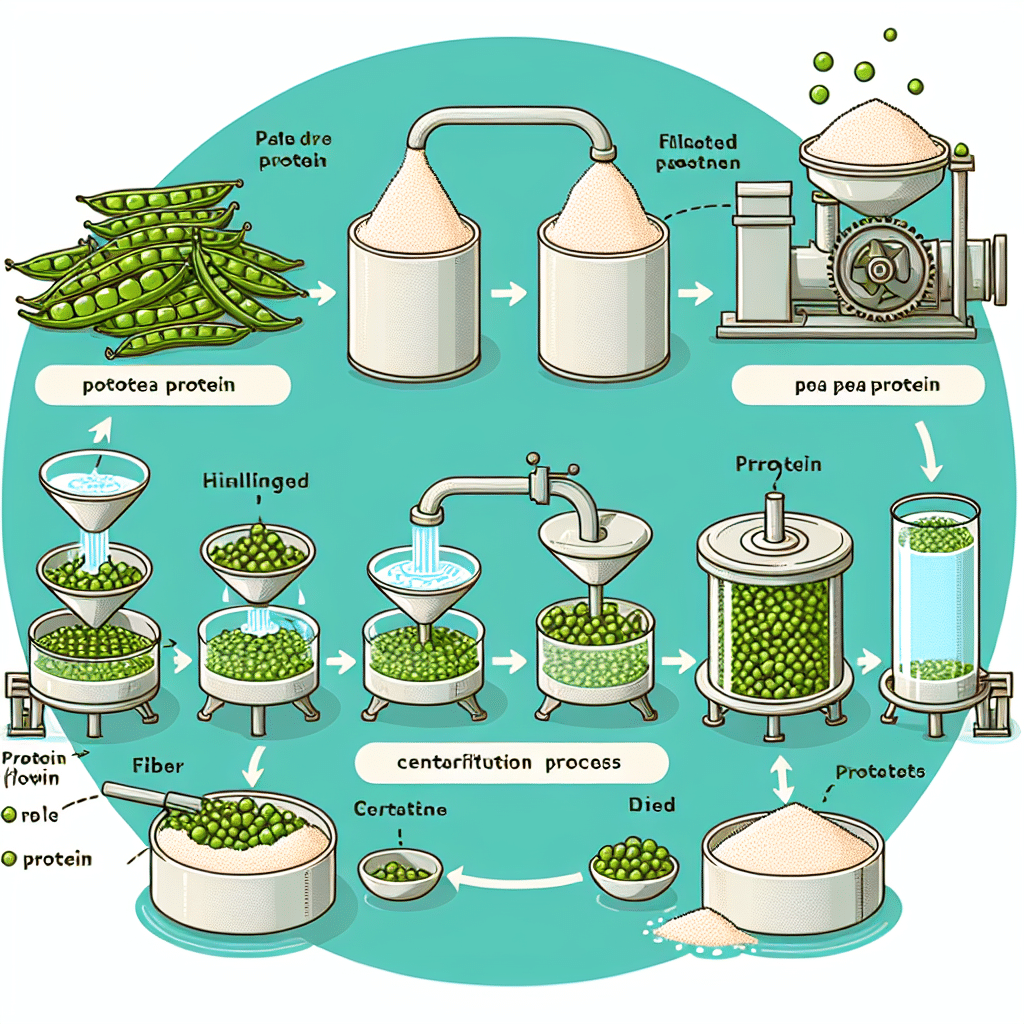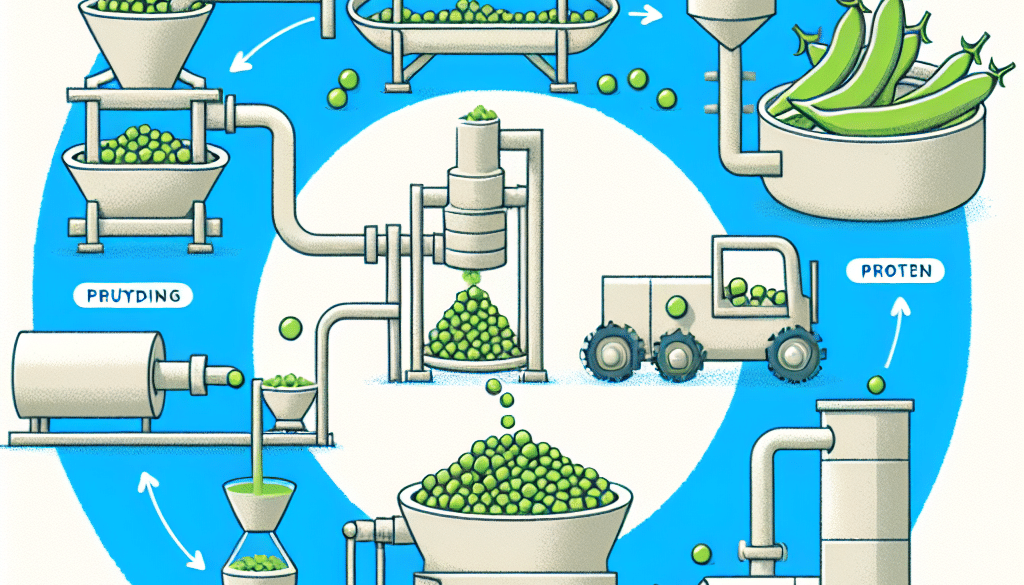Is pea protein highly processed?
-
Table of Contents
- Pea Protein: Is It Highly Processed or a Natural Protein Powerhouse?
- Understanding Pea Protein Processing
- The Journey from Pea to Protein Powder
- Nutritional Profile of Pea Protein
- Comparing Pea Protein to Other Proteins
- Is Pea Protein Considered Highly Processed?
- Processing Techniques and Their Impact
- Pea Protein in a Balanced Diet
- Incorporating Pea Protein into Your Diet
- Conclusion: Pea Protein’s Place in the Processed Food Spectrum
- Discover ETprotein’s High-Quality Pea Protein Products
Pea Protein: Is It Highly Processed or a Natural Protein Powerhouse?

Pea protein has emerged as a popular plant-based alternative to animal-derived proteins, especially among vegetarians, vegans, and those with dietary restrictions. As the demand for sustainable and allergen-free protein sources grows, so does the curiosity about the production and nutritional integrity of these alternatives. One question that often arises is whether pea protein is highly processed. This article delves into the production process of pea protein, its nutritional profile, and its place in a healthy diet.
Understanding Pea Protein Processing
Pea protein is derived from yellow split peas and is a high-quality protein that contains all nine essential amino acids. The process of making pea protein involves several steps, which can raise questions about its level of processing.
The Journey from Pea to Protein Powder
- Harvesting: The process begins with the harvesting of yellow split peas.
- Cleaning and Sorting: The peas are then cleaned and sorted to remove any impurities.
- Milling: The cleaned peas are milled into flour.
- Protein Isolation: The pea flour is processed to separate the protein from the fiber and starch. This is typically done using water or a water-ethanol mixture, which allows the protein to be separated out.
- Drying: The isolated protein is then dried and turned into a fine powder.
While this process may seem extensive, it’s important to note that the methods used to isolate and purify the protein are relatively gentle and do not involve harsh chemicals or extreme temperatures that could denature the protein or strip away its nutritional value.
Nutritional Profile of Pea Protein
Pea protein is not only a complete protein but also rich in iron and arginine, an amino acid that is beneficial for heart and muscle health. It is also hypoallergenic, making it a suitable option for those with allergies to dairy, soy, or gluten.
Comparing Pea Protein to Other Proteins
When compared to other plant-based proteins, pea protein stands out for its amino acid profile and digestibility. It is often compared to whey protein, a byproduct of cheese production and a staple in the fitness community. While whey protein is a complete protein and has a high biological value, pea protein is a more sustainable and allergy-friendly option with a comparable amino acid profile.
Is Pea Protein Considered Highly Processed?
The term “highly processed” is often associated with foods that have been significantly altered from their original state, often with the addition of artificial ingredients, preservatives, and flavorings. Pea protein does undergo processing to extract the protein from the peas, but this process is mechanical and physical rather than chemical.
Processing Techniques and Their Impact
The techniques used to create pea protein powder are designed to maintain the integrity of the protein and its amino acids. Unlike some highly processed foods, pea protein does not contain added sugars, artificial colors, or flavorings, unless these are added in the final product by the manufacturer.
Pea Protein in a Balanced Diet
Pea protein can be a valuable addition to a balanced diet, particularly for those looking to increase their protein intake without consuming animal products. It can be used in a variety of ways, from protein shakes and smoothies to baked goods and meat substitutes.
Incorporating Pea Protein into Your Diet
- Add pea protein powder to smoothies for a protein boost.
- Use it in baking to increase the protein content of bread, pancakes, and muffins.
- Look for meat substitutes that use pea protein as a base for a vegetarian or vegan alternative to burgers and sausages.
Conclusion: Pea Protein’s Place in the Processed Food Spectrum
In conclusion, while pea protein does undergo a series of processing steps to isolate the protein from the peas, it is not “highly processed” in the way that term is typically used to describe foods with little nutritional value. The methods used to create pea protein powder are focused on preserving its nutritional profile, making it a healthy and viable protein source for many individuals. With its complete amino acid profile and hypoallergenic properties, pea protein is a sustainable and nutritious plant-based protein option.
Discover ETprotein’s High-Quality Pea Protein Products
If you’re interested in incorporating pea protein into your diet, ETprotein offers a range of high-quality protein products that are organic, non-GMO, and allergen-free. Their pea protein is characterized by a neutral taste and is available in various grades to suit different industries, including nutraceuticals, pharmaceuticals, and food and beverage.
ETprotein’s commitment to quality and sustainability makes them a trusted supplier for consumers looking for plant-based protein options. To explore their products and learn more about how they can meet your protein needs, contact ETprotein and email sales(at)ETprotein.com today.
About ETprotein:
ETprotein, a reputable protein and L-(+)-Ergothioneine (EGT) Chinese factory manufacturer and supplier, is renowned for producing, stocking, exporting, and delivering the highest quality organic bulk vegan proteins and L-(+)-Ergothioneine. They include Organic rice protein, clear rice protein, pea protein, clear pea protein, watermelon seed protein, pumpkin seed protein, sunflower seed protein, mung bean protein, peanut protein, and L-(+)-Ergothioneine EGT Pharmaceutical grade, L-(+)-Ergothioneine EGT food grade, L-(+)-Ergothioneine EGT cosmetic grade, L-(+)-Ergothioneine EGT reference grade and L-(+)-Ergothioneine EGT standard. Their offerings, characterized by a neutral taste, non-GMO, allergen-free attributes, with L-(+)-Ergothioneine purity over 98%, 99%, cater to a diverse range of industries. They serve nutraceutical, pharmaceutical, cosmeceutical, veterinary, as well as food and beverage finished product distributors, traders, and manufacturers across Europe, USA, Canada, Australia, Thailand, Japan, Korea, Brazil, and Chile, among others.
ETprotein specialization includes exporting and delivering tailor-made protein powder and finished nutritional supplements. Their extensive product range covers sectors like Food and Beverage, Sports Nutrition, Weight Management, Dietary Supplements, Health and Wellness Products, and Infant Formula, ensuring comprehensive solutions to meet all your protein needs.
As a trusted company by leading global food and beverage brands and Fortune 500 companies, ETprotein reinforces China’s reputation in the global arena. For more information or to sample their products, please contact them and email sales(at)ETprotein.com today.












